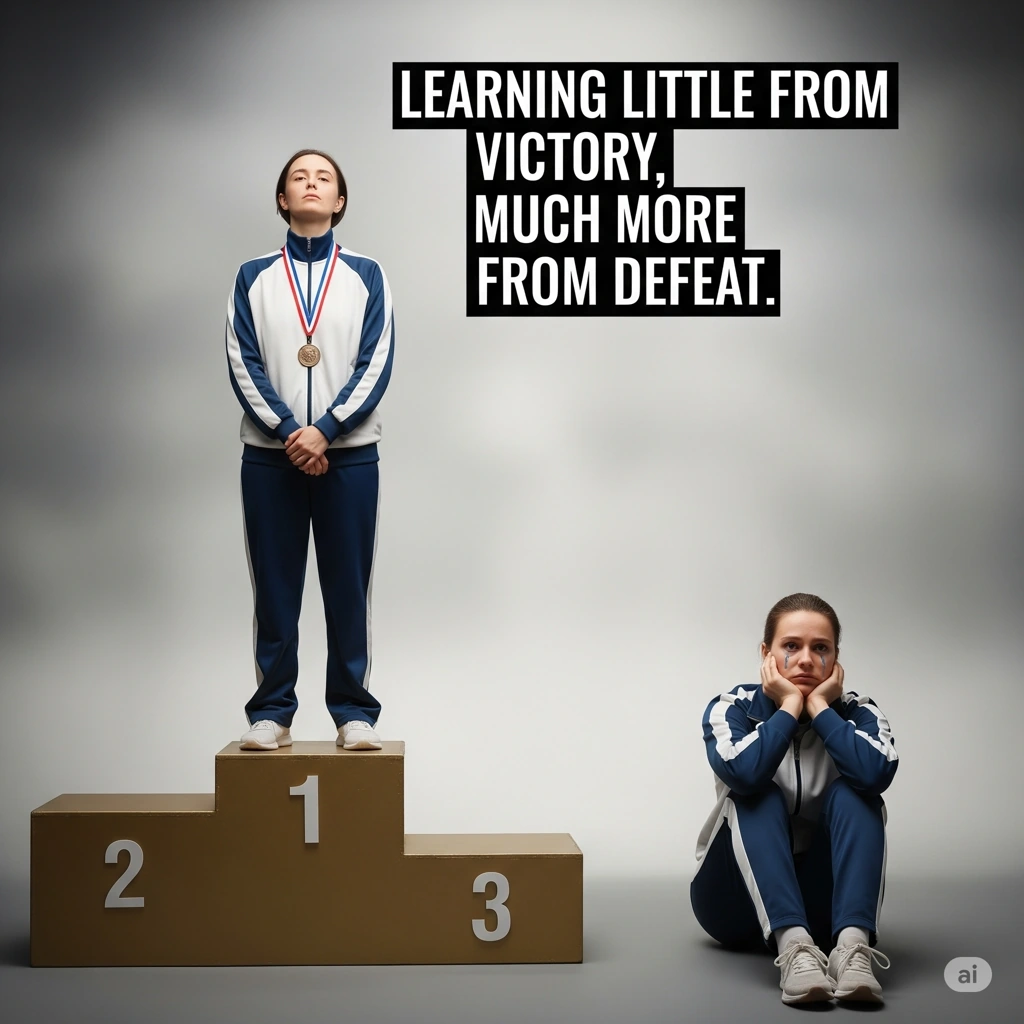The Nature of Victory and Defeat
Victories are sweet. They validate our efforts, boost our confidence, and often provide tangible rewards. However, victories can also lead to complacency. When we succeed, we may attribute it to our skills, talent, or hard work, but we might overlook the role of external factors like luck, timing, or the contributions of others. This can create a false sense of invincibility, blinding us to areas needing improvement.

Defeats, on the other hand, are painful. They challenge our self-esteem, force us to confront our limitations, and often come with a heavy dose of humility. However, it's precisely this discomfort that makes defeat a powerful teacher. Defeats compel us to analyze what went wrong, understand our weaknesses, and develop resilience. They push us out of our comfort zones and drive us to strive harder.
Examples of Learning from Defeat
Thomas Edison: The Light Bulb
One of the most cited examples of learning from failure is Thomas Edison and his invention of the light bulb. Edison famously said, "I have not failed. I've just found 10,000 ways that won't work." Each failure brought Edison closer to the solution, teaching him invaluable lessons about materials, electrical resistance, and perseverance. His relentless experimentation and learning from each defeat eventually led to one of the most significant inventions in human history.
Michael Jordan: Basketball Legend
Michael Jordan, widely regarded as one of the greatest basketball players of all time, also faced significant setbacks. He was cut from his high school basketball team, a moment that could have ended his athletic aspirations. Instead, Jordan used this defeat as motivation. He trained harder, honed his skills, and developed a fierce competitive spirit. Jordan later remarked, "I've missed more than 9,000 shots in my career. I've lost almost 300 games. Twenty-six times, I've been trusted to take the game-winning shot and missed. I've failed over and over and over again in my life. And that is why I succeed."

Extraordinary Journeys: Transforming Defeat into Triumph
J.K. Rowling: From Rejection to Harry Potter
J.K. Rowling's journey to becoming one of the best-selling authors of all time is a testament to the power of perseverance in the face of defeat. Before "Harry Potter" became a global phenomenon, Rowling faced numerous rejections from publishers. She was a single mother, living on welfare, and struggling with depression. Despite these hardships, Rowling continued to write and submit her manuscript. Each rejection was a blow, but it also provided feedback and an opportunity for refinement. Eventually, her persistence paid off, and "Harry Potter" became a cultural and literary milestone.
Steve Jobs: Resilience in Innovation
Steve Jobs, the co-founder of Apple Inc., experienced a significant professional defeat when he was ousted from his own company in 1985. This setback could have ended his career, but Jobs used it as a learning experience. He founded NeXT, a new computer platform development company, and acquired Pixar, a small animation studio. The knowledge and experience he gained from these ventures were invaluable when he returned to Apple in 1997. Under his leadership, Apple transformed into one of the most innovative and successful companies in the world, revolutionizing industries with products like the iPhone, iPod, and MacBook.
The Psychological Benefits of Embracing Defeat
Building Resilience
Resilience is the ability to bounce back from adversity. Defeats force us to confront challenges and develop coping strategies. This resilience not only helps us recover from setbacks but also prepares us for future obstacles. Each defeat becomes a lesson in endurance, teaching us that failure is not the end but a part of the journey.
Enhancing Problem-Solving Skills
When we face defeat, we are compelled to analyze the situation critically. This process of reflection and problem-solving enhances our analytical skills. We learn to identify patterns, understand the root causes of problems, and develop more effective strategies. This analytical approach is crucial for personal and professional growth.
Cultivating Humility
Victories can inflate our egos, while defeats humble us. Humility is a crucial trait for continuous learning and improvement. It allows us to accept feedback, recognize our limitations, and seek help when needed. Cultivating humility through defeat ensures that we remain grounded and open to new ideas and perspectives.
Turning Defeat into Motivation
Setting Realistic Goals
Defeats teach us the importance of setting realistic and achievable goals. Unrealistic expectations can lead to repeated failures and demotivation. By setting incremental goals and celebrating small victories along the way, we can build momentum and maintain motivation.
Seeking Feedback and Mentorship
Feedback is a powerful tool for learning. Seeking feedback from others, especially those with more experience, can provide valuable insights and guidance. Mentorship plays a crucial role in this process, as mentors can share their experiences, offer advice, and provide support during challenging times.
Embracing a Growth Mindset
A growth mindset, as opposed to a fixed mindset, views failure as an opportunity for growth rather than a reflection of one's abilities. Embracing a growth mindset means understanding that skills and intelligence can be developed through effort and learning. This mindset fosters resilience, encourages experimentation, and ultimately leads to greater success.
Conclusion
Learning little from victory and much more from defeat is a principle that can transform our approach to life. Embracing defeat as a learning opportunity allows us to develop resilience, enhance our problem-solving skills, and cultivate humility. The extraordinary journeys of individuals like Thomas Edison, Michael Jordan, J.K. Rowling, and Steve Jobs remind us that setbacks are not the end but stepping stones to greatness. By setting realistic goals, seeking feedback, and embracing a growth mindset, we can turn our defeats into powerful motivators for success. So, the next time you face a setback, remember that it's not the defeat that defines you but how you rise from it.